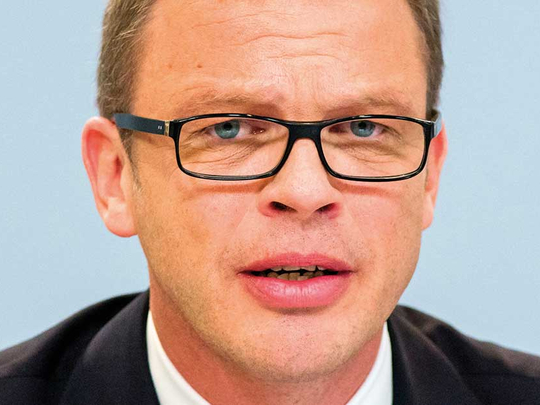
(Bloomberg) — Shares of Deutsche Bank rose as much as 4.7 per cent in Frankfurt on Monday after the lender appointed Christian Sewing — a retail banking executive and three-decade veteran of the company — to succeed John Cryan as chief executive officer, ending weeks of turmoil. Garth Ritchie was named head of the investment bank and co-deputy chief executive with Chief Administrative Officer Karl von Rohr.
Sewing’s appointment ends uncertainty and suggests management continuity while raising questions about the lender’s future direction, especially for the underperforming investment bank business, analysts said. Deutsche Bank is facing a difficult balance between the need to cut costs and not causing additional losses for investors or raising doubts about capitalisation, they said.
“The new CEO signals managerial continuity,” ending uncertainty about leadership. Still, Sewing’s retail background poses key questions about the direction and shape of the traditional investment bank business. It points to “significant upside potential” on the retail side coming from the merger with Postbank.
“We believe that Mr. Sewing has a wild card and the bank has a chance to be an outperformed in the sector,” Mueller says on Bloomberg TV. Sewing’s advantage is that he was head of risk management and knows where the problems are.
The biggest issue remains Chairman Paul Achleitner. The bank needs a “power from the outside,” and Achleitner’s days may be numbered.
Sewing’s background and pressure from shareholders such as Cerberus will raise expectations of additional restructuring. The bank needs to address a difficult balance between cutting low-profit businesses and not causing too much loss in shareholder value.
Cuts price target to EU13 from EU15, reflecting a 20 per cent cut of Credit Suisse’s medium-term EPS estimate due to greater uncertainty over the strategic outlook. The shares are already on too low a valuation to be more negative “considering a constructive start to the year in trading.”
The chief executive change will definitely launch a review of strategy, and this could potentially mean a significant reduction or sale of investment banking activities and a refocus on the retail and corporate business.
The departure of Marcus Schenck as co-deputy chief executive is not a surprise as Sewing’s selection is a “clear statement against investment banking focused strategy.” Expect a move toward private and commercial banking that will bring a “trade up in the short term” of Deutsche Bank shares.
Discussions of whether Deutsche Bank will further downsize the investment bank may be wide of the mark. Cryan’s view to potentially scale back in the US was opposed by Chairman Achleitner, who viewed the US as critical to the global investment bank model. Average returns (since 1970) of Commerzbank and Deutsche Bank are very similar despite the different business mix.
There is no “quick fix” and there is risk of “material” consensus earnings downgrades in the course of the year; wouldn’t rule out the possibility of another dilutive rights issue.
Operations outside the investment bank — notably German retail and corporate banking businesses — don’t produce a high return so “cutting IB does not automatically lead to a group ROE expansion.” The incoming CEO has outlined his ambition to focus on cost reduction, revenue growth and right-sizing the investment bank, which will be welcomed by the market.
The clarity provided by the announcement is welcome, and Sewing is a “credible, internal candidate.” Chairman Paul Achleitner now has questions to answer ahead of the annual meeting.
There are questions about why it was necessary to hire a chief executive when Cryan’s appointment was scheduled to end in 2020. Achleitner was closely involved in the development of Deutsche’s current strategy. Moreover during his tenure as chair, there has been “unusually high turnover” on Deutsche’s supervisory board.









